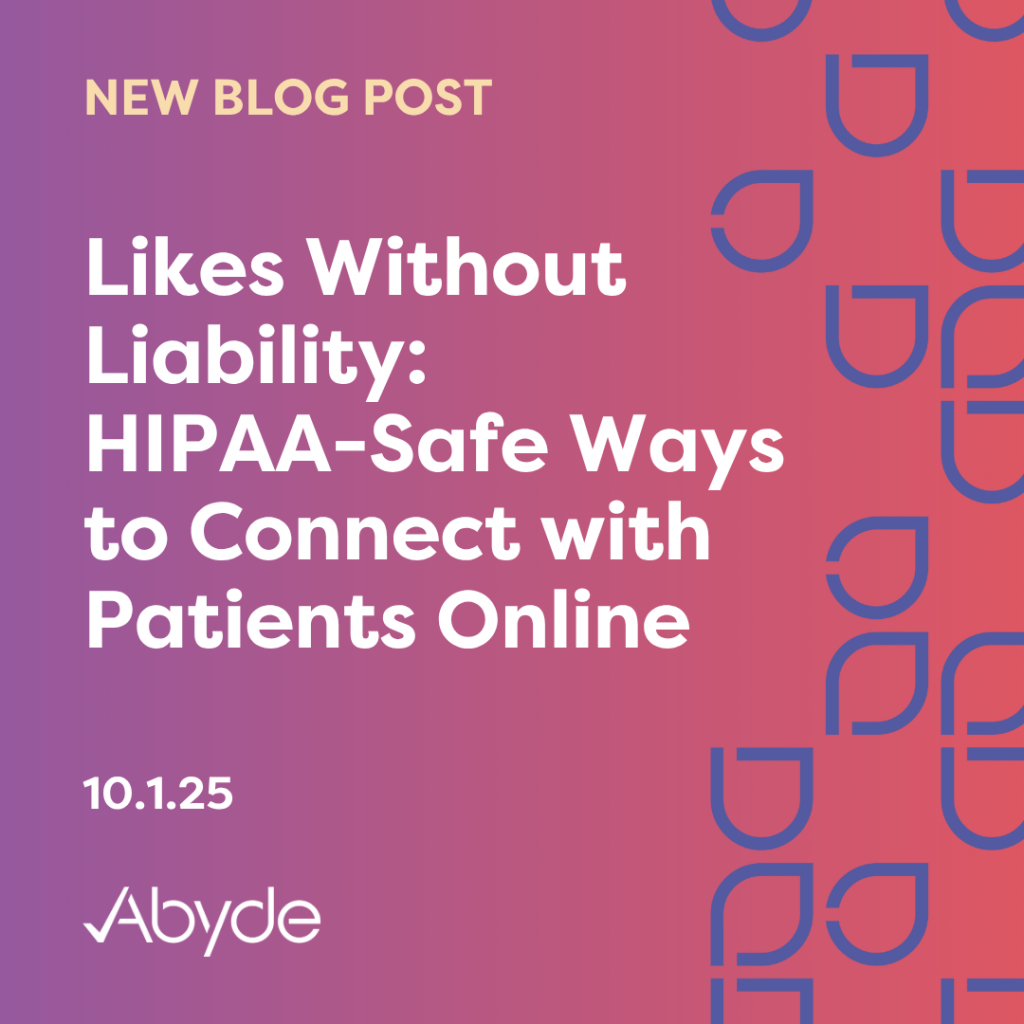October 1, 2025 Doing a TikTok with a patient might make your practice go viral for all the wrong reasons. In a world of social media, email marketing, and overall digital communication, connecting with your patients online is a no-brainer. However, the moment you step into the world of patient engagement, you run straight into red tape, the Health Insurance Portability and Accountability Act (HIPAA) regulations. While a photo of a patient might not seem like a big deal, your practice needs to safeguard patient data, or Protected Health Information (PHI). Typical forms of PHI include a patient’s name, image, Social Security Number, and health records. The internet provides numerous ways to connect and market to patients; your practice must do this carefully, securely, and compliantly. Social Media Landmines The very nature of social media sites like TikTok, Instagram, and Facebook encourages quick, personal sharing of content. These all directly conflict with the strict privacy requirements HIPAA upholds. The good news is, your practice can post with patients if the proper steps are followed to ensure HIPAA marketing compliance. First, your patient must sign a media consent form if their image is posted. This includes testimonials as well. Even if a patient had a great experience with your practice and wants to share, this documentation must be completed. This form must be specific and written, allowing the patient to withdraw permission easily. A verbal agreement isn’t going to cut it. PHI also can’t be shared when responding to Google or Yelp reviews. And yes, acknowledging that a patient attended your practice is considered PHI. Keep all responses brief and respectful. If a patient had a bad experience at your practice, try to take it offline and provide a secure channel to continue communication. Remember that HIPAA violations are not limited to your official practice accounts. Any of your practice’s staff is bound to HIPAA legislation. So, train and ensure staff know their responsibilities to keep PHI secure. No selfies at work! Safeguarding your Inbox Chances are, you’re sending emails every day in your practice. Let’s make sure your practice is sending emails compliantly. First up: encryption. Patient emails are considered PHI, so ensure all the necessary technical safeguards are in place to protect your inbox. After double-checking that the right patient receives an email, keep it simple and send only the minimum necessary information. A quick appointment reminder doesn’t need someone’s full health record attached. Next, consent matters. Your patients might be fine getting reminders or lab results by email, but that doesn’t mean they want marketing messages about specials at another location. Respecting their preferences keeps their information safe and your practice out of trouble. Make sure your practice documents this consent, and like media consent forms, allow your patients to change their permissions at any time. Posting with Peace of Mind This is just a quick roadmap for using marketing tools and HIPAA marketing compliance in your practice, but if done correctly, social media and email can be powerful ways to connect with your patients. Staying compliant isn’t just about following rules; it helps build trust with your patients, which is far more valuable than any number of Instagram followers. While your IT provider can always offer guidance on technical safeguards, understanding these basics is essential for keeping your practice and patient information safe. Smart, practical solutions can make HIPAA compliance easier for your practice. Connect with a compliance expert today to take the guesswork out of compliance.
HIPAA Compliant Digital Marketing for Healthcare Practices
July 8, 2020 Nowadays, you can shop online for anything – from chopsticks that double as LED lightsabers to a wig for your dog (seriously, we’re not kidding), and shopping online for a healthcare provider is no different. The internet plays a key role in a healthcare consumer’s decision making, in fact, according to a study released by the Pew Internet & American Life Project, “80 percent of Internet users, or about 93 million Americans, have searched for a health-related topic online.” Let’s face it, we use the internet for basically anything and everything nowadays especially as we continue to adapt in today’s COVID-19 world, which is why it’s important for your practice to understand what is and isn’t allowed when it comes to HIPAA compliance and online marketing. Using online marketing as a tool can be extremely beneficial for practices. Most medical practices have a website and many use social media and email marketing as tools to reach potential patients – ensuring you are utilizing these platforms in a HIPAA compliant manner is imperative to marketing in the right ways while still ensuring the privacy of your patients and security of your practice. Whether it be for your practice website, social media page, or advertisement – if you would like to use any type of patient information there are some strict guidelines to follow: Your Practice Website Having a HIPAA compliant website for your practice enables patients to search for information regarding the services that you provide, and ultimately drive new patients to you. The following are some key tips to follow when creating and maintaining the website for your practice: Email Marketing If choosing to use email marketing to engage with patients there are some key safeguards you must take to ensure you’re protecting your patients’ information and aren’t setting yourself up for a HIPAA violation: Social Media Nowadays social media platforms play a large role in consumers’ decision making. Having a strong social media presence can be a great asset to your practice, but in order to use social media to your advantage, you should follow these guidelines: Where marketing regulations get tricky is patient reviews or comments on digital platforms. While patients are able to post a review or comment about your practice, you cannot respond in any capacity that ties the patient to your practice. A dental practice in Texas was faced with a $10,000 fine along with a 2-year corrective action plan after they responded to a patients’ Yelp review. The practice had responded to multiple reviews the investigation found, disclosing patient information including names, medical diagnoses, and more and was only hit with a small fine due to their immediate cooperation with the Office for Civil Rights. On top of ensuring that you’re meeting all the criteria for a safeguarded online presence, you should also create a well-documented strategy that clearly outlines what’s permitted and what isn’t for your staff. This should cover the necessary policies and procedures for marketing to patient’s whether it is done online, over the phone, or in person.

